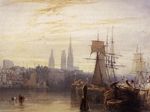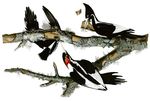Innsbruck Castle Courtyard - by Albrecht Dürer
←
→
Page content transcription
If your browser does not render page correctly, please read the page content below
Innsbruck Castle Courtyard
by Albrecht Dürer
Dürer was one of the earliest pioneers of modern watercolor
paints. He was also a master draftsman as you can see from
the excellent perspective and proportion he gives these
buildings. This scene is from somewhere in Italy when Dürer
went there to draw and paint. This was painted in 1494. It is
watercolor on paper.
Ivory Billed Woodpecker
by John James Audubon
This was painted between 1837 and 1828 and included in
Audubon's famous Birds of America book. Audubon's highly
detailed and lifelike bird paintings were done with watercolor
and sometimes charcoal for details. When they were first
printed they were engraved and then hand colored
assembly-line style by teams of artists.Eruption of Vesuvius
by J.M.W. Turner
This was painted in 1817 with watercolors and ink. Turner was
primarily known as an oil painter, but he was also one of
Britain’s finest watercolor painters as well. He favored
landscapes, often with a good bit of drama, like this scene of
an erupting volcano. At the time this was painted Mt.
Vesuvius in Italy had been undergoing tremors and eruptions
for twenty years. Tuner was intensely interested in the geology
of the earth. He had not seen this mountain in person at the
time of the painting. The form of the mountain and shape of
the bay is probably copied off of another artist's work.
Rouen
by Richard Parkes Bonington
This is watercolor on paper, done in 1825. The artist was
English, but moved to France as a young man, living there for
the rest of his life. This is a scene of the waterfront in Rouen,
France. The watercolor gives the scene a soft hazy feel.
Before his early death, the artist greatly influenced French art,
introducing watercolor to the continent. He knew Eugene
Delacroix intimately as Delacroix was his art teacher for a time
and the two shared a studio for several months and
reconnected from time to time.Shoshone Falls, Snake River, Idaho
by Thomas Moran
This was painted in about 1875 when Idaho was still part of the
wild west. Moran was part of the group called The Hudson
River School, American painters who focused on painting
nature scenes. Moran painted in both watercolor and oil
paints. This one is watercolor on paperboard.
Blue #2
by Georgia O'Keefe
This was painted in about 1916 and is one of the very early
paintings by O'Keefe. O'Keefe painted frequently with
watercolors and also with oil paints. She favored abstract
subjects early in her career, sometimes painting objects very
close up so that they appear abstract. Later in her career she
moved toward more realismChristmas Eve
by Carl Larson
This was painted in 1904-1905 and is watercolor on paper.
Larson was a Swedish painter who was extremely successful
as an illustrator and muralist. He often depicted scenes of
happy family life such as this one of Christmas Eve. His
children were often the models for his art. Larson is very
famous in his home country of Sweden and is considered one
of the great artists.
Autumn Landscape in Rybiniszki
by Stanisław Masłowsk
This watercolor on paper was painted in 1902. The artist
painted in oils as well. His favorite subjects were landscapes in
his native Poland. He was a prolific and successful artist
completing hundreds of paintings and exhibiting in shows all
around Europe. In Poland he is famous and is considered a
national artist.Boats on the Beach of Saintes-Maries
by Vincent van Gogh
Though Van Gogh is best known for his thick oil painting
techniques he also employed watercolor in hundreds of
works. Many of his watercolors, such as this one, are vivid and
brightly colored. This was painted in 1888 and was one of Van
Gogh's later works. The location is a town on the southern
coast of France near Arles where van Gogh spent a year. It
was the bright light of the south of France that inspired Van
Gogh to paint in vivid colors and his most famous paintings
were produced during this year including Starry Night,
Bedroom at Arles, Sunflowers, and the Cypress series.
The Blue Boat
by Winslow Homer
This was painted in 1892. It was first drawn in pencil and then
painted over with watercolors. Winslow Homer was an
American illustrator and landscape painter, best known for his
seascapes. His first art lessons were from his mother, a gifted
watercolor painter. Watercolor remained his favorite medium
throughout his life.Twittering Machine
by Paul Klee
This was painted in 1922 in ink and watercolor. It shows birds
sitting on a wire that is attached to a hand crank. People see
this as representing things as diverse as the triumph of nature
over machine, a feeling of helplessness experienced by the
artist, and a visual interpretation of sound. This painting was
rejected as degenerate art by Adolph Hitler and it was sold
by the Nazi's to an art dealer who sold it to the Metropolitan
Museum of Art in New York City where it hangs in one of the
galleries. It is one of the most popular of the museum's
collection.
Fishing Boats, Le Pouliguen
by Paul Signac
Paul Signac was a French Neo-impressionist who worked on
pointillism with Georges Seurat. This painting is a watercolor
which today is in the collection of the Metropolitan Museum
of art in New York City. Signac would often use watercolor as
a relaxing break from the technical tedium and rigors of the
pointillist style that he employed with his oil paints. This
painting is part of a series on the harbors of France that
Signac did in 1928.Watercolor Art Cards
This set contains watercolor paintings from many different periods and styles of art. Watercolor has not
enjoyed the same degree of popularity as oil painting. Watercolor became popular in England in the late
1700s and from there spread to the continent and North America. Most artists who painted in watercolors
also painted in oils. Watercolor is less forgiving than oil paints since once the paint is put to the paper it
cannot be manipulated further whereas oil paints take quite some time to dry and so can be worked on the
canvas.
Print these art cards and descriptions onto white card stock. Cut the cards out on the solid lines.
Help your kids become familiar with these paintings and artists by playing matching games, sorting the
cards, and quizzing over them.
1. Place the cards face down, with images in one group and description cards in another group.
Choose one card from each group. Determine if they match. You can read the description of the
painting to see if they do.
2. Arrange the paintings in order of date. Which were painted first? Can you see a progression of
techniques or style in the cards?
3. Hold up an image card and see if your child can remember the title of the painting. After these are
mastered, use the image cards to memorize the titles and artists together. Finally master the titles,
artists, and a little information about the painting.
4. Go online and find more art by the same artists. Can you tell which artist painted the piece just by
looking at the style?
Layers of LearningYou can also read



























































